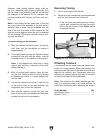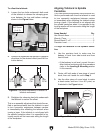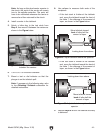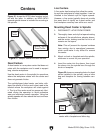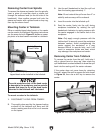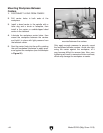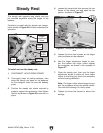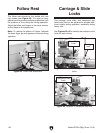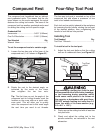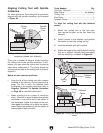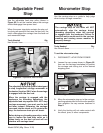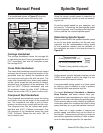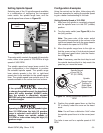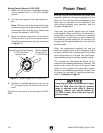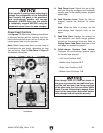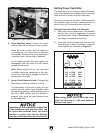
Model G0740 (Mfg. Since 11/12)
-47-
The four-way tool post is mounted on top of the
compound rest and allows a maximum of four
tools to be loaded simultaneously.
Each tool can be quickly indexed to the workpiece
by loosening the top handle, rotating the tool post
to the desired position, then re-tightening the
handle to lock the tool into position.
2. Rotate the rest to the desired angle, as
indicated by the scale at the base,
then retighten the two hex nuts.
Tip: The first time you set the angle of the
compound rest for cutting threads, mark the
location on the cross slide as a quick refer-
ence point. This will allow you to quickly
return the compound rest to that exact angle
the next time you need to cut threads.
The compound rest handwheel has an indirect-
read graduated scale. This means that the dis-
tance shown on the scale represents the actual
distance the cutting tool moves. The base of the
compound rest has another graduated scale used
for setting the cutting tool to a specific angle.
Graduated Dial
Increments ................................. 0.001" (0.02mm)
One Full Revolution ................... 0.100" (2.54mm)
Tool Needed Qty
Wrench 14mm ................................................... 1
To set the compound rest at a certain angle:
1. Loosen the two hex nuts at the base of the
compound rest (1 of 2 shown in Figure 61).
Figure 61. Compound rest.
Hex Nut
(1 of 2)
Angle Scale
Compound
Rest
Compound Rest Four-Way Tool Post
Tool Needed Qty
Tool Post T-Wrench ........................................... 1
To install a tool in the tool post:
1. Adjust the tool post bolts so that the cutting
tool can fit underneath them (see Figure 62).
Installing Tool
2. Firmly secure the cutting tool with at least two
tool post bolts.
3. Check and adjust the cutting tool to the
spindle centerline, as instructed in the next
subsection.
Figure 62. Example of tool mounted in tool post.
Cutting
Tool
Tool Post
Bolt
Over-extending a cutting tool from the post
will increase the risk of tool chatter, breakage,
or tool loosening during operation, which
could cause metal pieces to be thrown at
the operator or bystanders with great force.
DO NOT extend a cutting tool more than 2.5
times the width of its cross-section (e.g.,
2.5 x 0.5" = 1.25").



